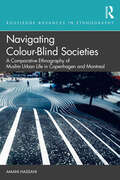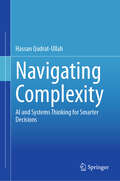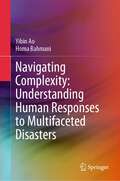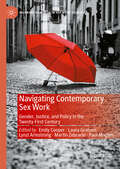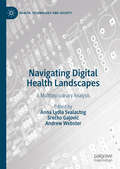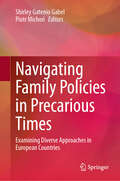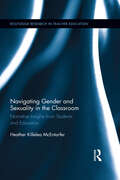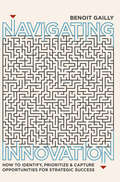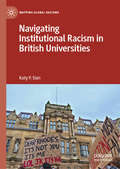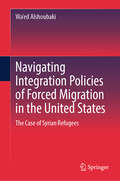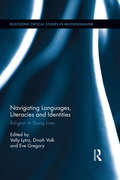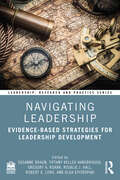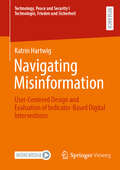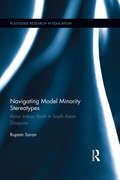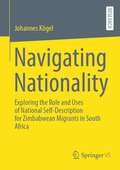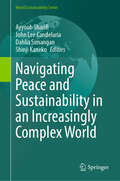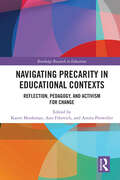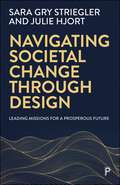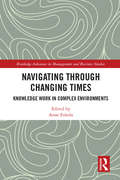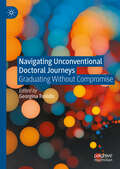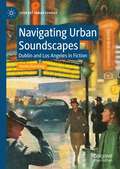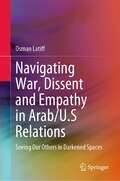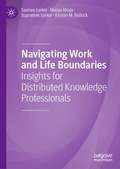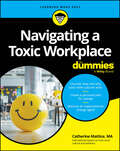- Table View
- List View
Navigating Colour-Blind Societies: A Comparative Ethnography of Muslim Urban Life in Copenhagen and Montreal (Routledge Advances in Ethnography)
by Amani HassaniNavigating Colour-Blind Societies is a comparative ethnography of racialisation, class, and gender in the lives of young Muslims coming of age in societies where race is deemed insignificant. The book offers insights into the urban lives of young middle-class Muslims in Copenhagen and Montreal. Based on their narratives, the book examines racialisation as (1) a social process that is classed and gendered and (2) a spatial process that is social and temporal. Denmark and Quebec have seen an increasing thrust of nationalist politics in recent years, which position their Muslim citizens as the quintessential “Other.” The book contributes to our understanding of how Muslims are racialised and how they navigate this process of racialisation in social and urban life. The interaction between movement and life stories provides a unique vantage point in bringing the city to life from the perspective of these young adults. The book appeals widely to academics and students in sociology, anthropology, and human geography. It also appeals to a wider audience interested in anti-racist scholarship and Muslim experiences in the Global North.
Navigating Complexity: AI and Systems Thinking for Smarter Decisions
by Hassan Qudrat-UllahThis book, “Navigating Complexity: AI and Systems Thinking for Smarter Decisions” delves into the integration of Artificial Intelligence (AI) and systems thinking to enhance decision-making in complex and dynamic environments. Aimed at professionals, researchers, and academics in fields such as management, healthcare, sustainability, and public policy, it provides a comprehensive exploration of how these two approaches can be synergistically employed. The main topics include the theoretical foundations of complexity science, the practical application of AI and systems thinking tools, and real-world case studies demonstrating their combined use. These topics are crucial as they address the need for advanced methodologies to navigate and manage the increasing complexity in modern decision-making scenarios. The book seeks to solve the problem of effectively managing complexity by offering innovative frameworks and models that integrate AI’s data-driven capabilities with systems thinking’s holistic approach. This integration is essential for improving decision-making processes across various domains, providing readers with actionable insights and tools to tackle contemporary challenges.
Navigating Complexity: Understanding Human Responses to Multifaceted Disasters
by Yibin Ao Homa BahmaniThis thought-provoking book unravels the intricate interplay between human behavior and disasters, weaving a rich narrative that transcends traditional boundaries. Embark on a captivating exploration of human responses to multifaceted disasters with this book. Unveiling the human psyche and the intricate web of emotions that intertwine with disaster events, this book offers a profound understanding of human responses to multifaceted disasters.Written with precision and meticulous research, this book captivates scholars, practitioners, and policymakers alike. Its multidimensional perspectives offer valuable insights for disaster management, urban planning, sociology, and public health, transcending disciplinary boundaries.
Navigating Contemporary Sex Work: Gender, Justice, and Policy in the Twenty-First Century (Palgrave Advances in Sex Work Studies)
by Paul Maginn Martin Zebracki Lynzi Armstrong Emily Cooper Laura GrahamThis book draws together interdisciplinary perspectives to examine the legal, moral, and socio-spatial regulation of sex work in the contemporary context. With a thematic focus on the gendered landscape of sex work, formal and informal methods of socio-spatial control, and (in)access to justice, this book explores the role of space in the regulation of sex work in diverse contexts, from the local to the global. The chapters collectively bring together complex, inter-related issues that impact the lives of sex workers throughout the world, providing evidence of the impacts of regulation on sex workers and subsequent barriers to accessing justice and rights. This collection centres the regulated lives of sex workers, using an intersectional lens that highlights the gendered and racialised impacts of stigma. Incorporating knowledge derived from both academic research and lived experience, this book provides a unique contribution that will be of interest to academics and policy-makers globally.
Navigating Differences: Friendships Between Gay and Straight Men
by Jammie PriceNavigating Differences: Friendships Between Gay and Straight Men is a one-of-a-kind cross-sexual study that shows you how today’s gay and straight men build, maintain, and foster true friendships. In this activist, participatory study, you’ll get a day-in-the-life look at 44 pairs of cross-sexual men’s friendships and see what helps them negotiate the terrain of their emotional, sexual, psychological, and social differences in today’s climate of often publicly defended homophobia and heterosexism.Navigating Differences succeeds in bringing the true picture of cross-sexual men’s relationships to you, regardless of your personal orientation or political affiliation. You’ll find information--straight from the lives of the study’s participants--that shows you how different sexual orientations impact the way men spend time together, maintain friendships, cope with sexual struggles, and open good communication channels. Most importantly, you’ll get detailed facts and feedback concerning: hegemonic masculinity embracing, struggling with, and ignoring differences group demographic characteristics embeddedness and emotional communication outness in-groups, out-groups, and reference groupsHearsay and prejudice might claim to know what gay and straight men think of each other, but Navigating Differences replaces rumors with research and shows you what really keeps gay and straight men in lasting friendships in all arenas of life. You’ll learn firsthand what it takes to overcome differences and what it means to turn difference into meaningful relationships.
Navigating Digital Health Landscapes: A Multidisciplinary Analysis (Health, Technology and Society)
by Andrew Webster Anna Lydia Svalastog Srećko GajovićNavigating Digital Health Landscapes explores how users navigate the internet when searching for health information. It is the first book to conceptualise the internet as a landscape and the ways in which people navigate this digital world, including the complex entanglements between on and offline domains. It does so through a range of disciplinary perspectives from expert contributors across STS (science and technology studies), social anthropology, biomedicine, ethics and law, linguistics, social policy and computer scientists working in more technical aspects of tracking and visualising data and information on the internet. The book provides a unique and valuable contribution for those wishing to understand how digital technologies are affecting the design, implementation and use of digital systems to manage health information in different contexts.
Navigating Family Policies in Precarious Times: Examining Diverse Approaches in European Countries
by Shirley Gatenio Gabel Piotr MichońThis book critically analyzes how European countries manage family-related challenges as they grapple with social and political transformations. It contributes to our understanding of contemporary family issues and serves as a bridge between academic analysis and practical policymaking. In an era marked by dynamic and precarious societal shifts, evolving family structures, and intricate policy landscapes, the imperative to comprehensively examine family life, social risks, and policies becomes increasingly apparent. This contributed volume delves into how changes in family and gender roles, work, and household composition have affected the intricacies of parental leave policies, societal attitudes, and the inherent precarity within family life. The chapters, composed by esteemed authors, provide both a national and a cross-national perspective, offering invaluable insights into the diverse ways families and states navigate the complexities of contemporary society, highlighting the unaddressed vulnerabilities created by existing public policies. The contents explore the nexus of changes in family, policy, and welfare state responsibilities with a focus on: Parental Leave Policies and Effects Lone Parenthood The Effects of Family Policy on Entering and Exiting the Labor Force Changing Attitudes Around Gender Roles and Policy Navigating Family Policies in Precarious Times guides readers through the complex interplay of familial experiences, social risks, and the multifaceted landscape of family policies across Europe. The book is an indispensable resource for examining policies and challenges encountered by contemporary families for policymakers, scholars, and practitioners. Its focus on Eastern European countries makes it a particularly relevant and engaging resource for students and educators interested in social policy and the complexities of family life in this region. With an interdisciplinary approach to a growing social issue, the book is a valuable resource for researchers in sociology, social work, economics, psychology and political science. It also can be used as a text in undergraduate and graduate courses on family such as Family Studies, Human Behavior & Social Environment, and Social and/or Family Policy courses.
Navigating Gender and Sexuality in the Classroom: Narrative Insights from Students and Educators (Routledge Research in Teacher Education)
by Heather Killelea McEntarferGender identity and sexuality play crucial roles in the educational experiences of students, parents, and teachers. Teacher education must more directly address the ways that schools reflect and reproduce oppressive gender norms, working to combat homophobia, transphobia, heteronormativity, and gendered expectations in schools. This volume examines teacher candidates’ experiences with gender and sexuality in the classroom, offering insight and strategies to better prepare teachers and teacher educators to support LGBTQ youth and families. This volume addresses the need for broader, more in-depth qualitative data describing teacher candidates’ responses to diversity in the classroom (including gender, sexuality, race, class and religion). By using pedagogical tools such as narrative writing and positioning theory, teacher candidates explore these issues to better understand their own students’ narratives in deeply embodied ways. This book calls for schools to be places where oppression, in all its complexity, is explored and challenged rather than replicated.
Navigating Innovation: How To Identify, Prioritize And Capture Opportunities For Strategic Success
by Benoit GaillyEvery firm must maintain an entrepreneurial ecosystem and a coherent innovation strategy in order to stay ahead of the competition. For managers this means being able to build a vision of what innovation looks like in the context of their organization, fostering entrepreneurial behaviour, spotting opportunities and making the right decisions. Based on years of practical experience and unique insight, this handy guide identifies fundamental challenges and is rooted in concrete examples. Accompanied by a brand new app for iPhone and Android as well as a companion website (www.NavigatingInnovation.org), this is an easy dip in, dip out guide with a focus on successful execution. Navigating Innovation is a one-stop-shop, giving you a deeper understanding of the core concepts and tools to capture the right opportunities for your business.
Navigating Institutional Racism in British Universities (Mapping Global Racisms)
by Katy P. SianThis book critically examines the experiences of racism encountered by academics of colour working within British universities. Situated within a critical race theory and postcolonial feminist framework, Sian thoughtfully centres the voices of the interviewed academics, and draws upon her own experiences and reflections through a critical auto-ethnography. Navigating Institutional Racism in British Universities unpacks a range of complex and challenging questions, and engages with the way in which racial politics in the academy interplay and intersect with gender. The book presents a textured narrative around the various barriers facing academics of colour, and enhances understandings of experiences around institutional racism in British universities. Alongside its conceptual and empirical contribution, it develops a series of practical recommendations to encourage and facilitate the active participation of academics of colour in British universities.
Navigating Integration Policies of Forced Migration in the United States: The Case of Syrian Refugees
by Wa'ed AlshoubakiThis book investigates the integration of Syrian refugees in the United States, and it identifies the challenges that hinder their successful integration. After providing a comprehensive analysis of the U.S. legal instruments in national and international laws and obligations to receive forced migrants, the book then highlights the resettlement process and programs as a coordinated interagency process that entails a collaboration between the UN Refugee Agency and the related U.S. departments and agencies and the nongovernmental partners and refugee advocacy organizations. Moreover, it delves into integration as a proxy theory and governance that entails an analytical component from a theoretical lens to understand some aspects of realities that revolve around the resettlement of forced migrants' concepts, principles, and policies. Built on rich qualitative data from Syrian refugees in the U.S. to understand their resettlement experiences and their integration in multidimensional analysis, the book shows how the lack of federally driven integration policies and institutions in the U.S. negatively affects just integration. Relying on voluntary organizations leads to uneven outcomes among forced migrants, affecting social equity. Alongside this book's theoretical and practical implications, it highlights the ethical consideration of studying forced migrants and the synergy between forced migrants' vulnerability and cultural sensitivity. Ultimately, the book discusses the roadmap for implementing integration policies in the U.S. Among the topics covered: Introduction: The History of Managing Forced Migration in the U.S.: Political Climate and Global Events The U.S. Legal and Institutional Frameworks of the Resettlement of Syrian Refugees The Syrian Refugees' Integration Challenges in the U.S. and the Roadmap for Integration Policies Navigating Integration Policies of Forced Migration in the United States: The Case of Syrian Refugees is relevant reading for researchers who are interested in integration and refugee-related topics; academics who conduct research in social policies, refugee integration, and resettlement; public policymakers who are involved in formulating refugee integration policies; practitioners at various levels who assist resettled forced migrants; and graduate students studying political science, public administration, social work, and sociology. Politicians with left-wing views who are advocating for improved human security for everyone also would find the book a useful resource.
Navigating Languages, Literacies and Identities: Religion in Young Lives (Routledge Critical Studies in Multilingualism)
by Eve Gregory Vally Lytra Dinah VolkNavigating Languages, Literacies and Identities showcases innovative research at the interface of religion and multilingualism, offering an analytical focus on religion in children and adolescents’ everyday lives and experiences. The volume examines the connections between language and literacy practices and social identities associated with religion in a variety of sites of learning and socialization, namely homes, religious education classes, places of worship, and faith-related schools and secular schools. Contributors engage with a diverse set of complex multiethnic and religious communities, and investigate the rich multilingual, multiliterate and multi-scriptal practices associated with religion which children and adolescents engage in with a range of mediators, including siblings, peers, parents, grandparents, religious leaders, and other members of the religious community. The volume is organized into three sections according to context and participants: (1) religious practices at home and across generations, (2) religious education classes and places of worship and (3) bridging home, school and community. The edited book will be a valuable resource for researchers in applied linguistics, linguistic anthropology, socio-linguistics, intercultural communication, and early years, primary and secondary education.
Navigating Leadership: Evidence-Based Strategies for Leadership Development (ISSN)
by Susanne Braun Olga Epitropaki Rosalie J. Hall Tiffany Keller Hansbrough Gregory A. Ruark Rosalie G. LordNavigating Leadership provides evidence-based tools and recommendations to develop your leadership successfully. The book integrates knowledge in the areas of leadership and followership from evidenced-based global research and translates the findings into suggestions for organizational best-practices.Am I leader? How can I grow as a leader? How am I doing as leader? How can I move on and let go of leadership? In a changing world of work, people are confronted with these questions about their leadership every day. This book considers such topics as reflecting on goals, impostorism, memory, experiencing meaningfulness at work , measuring leader performance and the challenge of leaving leadership, to offer ideas and answers to these questions of what it means to be a leader and how you can thrive on your own personal leadership journey. Each chapter provides a range of applied cases, tools and techniques, and critical commentaries to help uncover your leader identity, address personal challenges, and accelerate your leadership development.Addressing the persistent gap between research and practice in leadership and followership through research-practice translation, this is the ideal resource for professionals, at both an individual and organizational level, looking to support and increase leadership development. It will also appeal to scholars and students of leadership, followership, and leader identities.
Navigating Misinformation: User-Centered Design and Evaluation of Indicator-Based Digital Interventions (Technology, Peace and Security I Technologie, Frieden und Sicherheit)
by Katrin HartwigInformed navigation of misinformation on social media constitutes a major challenge. The field of Human-Computer Interaction (HCI) suggests digital misinformation interventions as user-centered countermeasures. This book clusters (1) existing misinformation interventions within a taxonomy encompassing designs, interaction types, and timings. The book demonstrates that current research mostly addresses higher-educated participants, and targets Twitter/X and Facebook. It highlights trends toward comprehensible interventions in contrast to top-down approaches. The findings informed (2) the design, implementation, and evaluation of simulated apps for TikTok, voice messages, and Twitter/X as indicator-based interventions. Therefore, (3) the book identified misinformation indicators for various modalities that were perceived as comprehensible.The book empirically demonstrates that (4) indicator-based interventions are positively received due to their transparency. However, they also come with challenges, such as users' blind trust and lack of realistic assessments of biases. This research outlines chances and implications for future research.
Navigating Model Minority Stereotypes: Asian Indian Youth in South Asian Diaspora (Routledge Research in Education #146)
by Rupam SaranThough Asian Indians are typically thought of as a "model minority", not much is known about the school experiences of their children. Positive stereotyping of these immigrants and their children often masks educational needs and issues, creates class divides within the Indian-American community, and triggers stress for many Asian Indian students. This volume examines second generation (America-born) and 1.5 generation (foreign-born) Asian Indians as they try to balance peer culture, home life and academics. It explores how, through the acculturation process, these children either take advantage of this positive stereotype or refute their stereotyped ethnic image and move to downward mobility. Focusing on migrant experiences of the Indian diasporas in the United States, this volume brings attention to highly motivated Asian Indian students who are overlooked because of their cultural dispositions and outlooks on schooling, and those students who are more likely to underachieve. It highlights the assimilation of Asian Indian students in mainstream society and their understandings of Americanization, social inequality, diversity and multiculturalism.
Navigating Nationality: Exploring the Role and Uses of National Self-Description for Zimbabwean Migrants in South Africa
by Johannes KögelIn recounting their migration journey, references to nationality pervade the narratives of Zimbabweans in South Africa. Given the challenges many migrants confront based on their nationality, this presents a seeming paradox. This qualitative interview study, conducted with Zimbabwean migrants in two areas of Cape Town—Observatory and Dunoon—aims to elucidate the nuances of national self-descriptions in a demanding environment. Identifying as Zimbabwean serves as a sanctuary and a retreat, where alternative identifications often prove transient; embracing Zimbabweanness fosters an affirmative and positive self-perception, surpassing the limitations of other collective self-descriptions. Rather than pre-emptively characterizing a nationalist demeanour, the articulation of national self-description emerges as a strategic tool to navigate experiences of hostility and discrimination, while also asserting legitimate claims to equal opportunities. In this way, nationality takes a trajectory that diverges from conventional notions of nationality (and the ones of the nation-state or citizenship) as per Northern theory, contributing to alternative conceptualizations within the framework of the Global South.
Navigating Peace and Sustainability in an Increasingly Complex World (World Sustainability Series)
by Shinji Kaneko Ayyoob Sharifi Dahlia Simangan John Lee CandelariaThis book, a sequel to a well-received book titled “Bridging Peace and Sustainability Amidst Global Transformations,” delves deeper into the entwined roots of peace and sustainability and emphasizes their interdependence. How are peace and sustainability interconnected, and what key factors define the relationship between them? These questions were examined at the NERPS 2024 conference in Hiroshima and are central to our narrative. In this book, we explore the synergy of peace and sustainability through theoretical frameworks and real-world examples.We recognize that while the 2030 Agenda for Sustainable Development has acknowledged the link between peace and sustainability, a significant gap remains. Too often, efforts to promote peace and sustainability run parallel, never intertwining, losing the chance to bolster each other. We argue for merging the peace and sustainability agendas to confront contemporary challenges, calling for action to enhance and take advantage of their mutual reinforcement. Through diverse perspectives, this collection illuminates the social, economic, and environmental dimensions of this nexus, serving as a guide for policymakers, a reference for researchers, and a catalyst for dialogue among sectors committed to achieving the Sustainable Development Goals.
Navigating Precarity in Educational Contexts: Reflection, Pedagogy, and Activism for Change (Routledge Research in Education)
by Karen Monkman Ann Frkovich Amira ProwellerThis volume offers a timely collection of research-based studies that engage with contemporary conditions of precarity across an array of locations, exploring how it is understood, experienced, and acted upon by educators in schools, universities, and nonformal educational spaces. Precarity presents as layered, unpredictable, destabilizing, and rapidly shifting socio-political and economic dynamics, shown here in various forms, including the global pandemic, divisive populist politics, displacement of refugees and the landless, race and gender injustices, and neoliberal policies that constrain educational and social possibilities. Grouped around reflection, educational practice, and social activism, the authors show how educators engage these precarious conditions as they work toward a more interconnected, humane, and just society. This text will benefit researchers, academics, and educators with an interest in social foundations of education, multicultural and social justice education, educational policy, and international and comparative education, sociology and anthropology of education, and cultural studies within education, among other fields.
Navigating Societal Change through Design: Leading Missions for a Prosperous Future
by Sara Gry Striegler Julie HjortThe social and environmental challenges we face today are complex and interdependent. Leaders and experts worldwide acknowledge that we cannot address them in isolation and that to keep doing so is to intensify the problem. This book connects the dots between a group of diverse, but overlapping, professional domains: design, mission-oriented innovation, foresight and futures design, system innovation and leadership. The authors mix methodology and theory with real-life case studies and compelling visual models to aid readers in navigating a new story, balancing tensions in time scale and mindset, learning through experiments and working collaboratively. Aimed at policy makers, practitioners and educators, this book encourages a new and heightened awareness of systemic change that can lead to societal transformation in support of a sustainable future.
Navigating Through Changing Times: Knowledge Work in Complex Environments (Routledge Advances in Management and Business Studies)
by Anne EskolaComplexity theory including the concepts of chaos and emergence has been considered one of the most revolutionary products of the 20th century having influence on science, technology and economics among others. Any complex systems, such as organisms, societies, stock market or the Internet, have emergent properties that cannot be reduced to the mere properties of their parts. The theory has been used in organizational studies and strategic management where it offers an alternative way to look at organizations. The theory rejects the idea of organizations seen as machines and a planned approach to organizational change. Instead, the theory underlines understanding on how organizations adapt to their environments. Complexity theory suggests that organizations tend to self-organize themselves to a state where they regulate themselves. Complexity theory would advocate for approaches that focus on flatter, more flexible organizations. It shifts focus from management control to self-organization and individual interrelations between different people. The aim of Navigating through Changing Times: Knowledge Work in Complex Environment is to give insights on how complexity has changed the environment of many business organizations. The book aims at identifying and discussing special features of business organizations performing knowledge work in a knowledge-oriented economy. Navigating through Changing Times: Knowledge Work in Complex Environment will be vital reading for those scholar and researchers in the fields of knowledge and wisdom management as well as organizational behavior and communication, HRM, strategy, culture, change and development and other related disciplines.
Navigating Unconventional Doctoral Journeys: Graduating Without Compromise
by Georgina TsolidisThis edited book delves into the experiences of a group of women who, as mature aged students, took on doctoral studies, persevered and succeeded. Drawing on their own experiences, the group of women from varied backgrounds consider, with hindsight, what prompted them to begin doctoral studies, what hurdles they faced, the strategies that supported their completions and how their doctoral success influenced their future journeys. The editor of the collection, Georgina Tsolidis, was their supervisor. The chapter authors, Stella Coram, Annabelle Leve, Melinda McPherson and Vikki Pollard, explore their motivation to enter doctoral study in turn. These case studies contribute to an overarching analysis of why women who are classified as mature aged students and have child rearing, work and other commitments choose to undertake such a challenging academic journey. The book will be of interest to researchers and postgraduate students of higher education, sociology of education and gender studies.
Navigating Urban Soundscapes: Dublin and Los Angeles in Fiction (Literary Urban Studies)
by Annika EisenbergNavigating Urban Soundscapes: Dublin and Los Angeles in Fiction offers an innovative analytical framework to explore sound in different media and across two distinct urban soundscapes. Studying a wide range of novels, films, and radio dramas, using Dublin and Los Angeles as case studies, Annika Eisenberg asks how sounds are aestheticised to signify urban space in fiction, and how sounds allow such fictional urban spaces to be navigated, both by auscultators, the characters listening within a work of fiction, and by auditeurs, the implied audience of a fictional work. Eisenberg argues that the concept of “urban sound” is a cultural and aesthetic construct, and in doing so, she shows why aesthetics needs to be front and center in sound studies.
Navigating War, Dissent and Empathy in Arab/U.S Relations: Seeing Our Others in Darkened Spaces
by Osman LatiffThis book focuses on American political discourse connected to war, dissent, and empathy. Through interdisciplinary methods of history, politics and media studies, the book examines ways in which American self-identity alters as a consequence of media portrayal of human suffering and of its existential others. It compares representations of the Iraq wars to earlier precedents and looks at the work of American activists, assessing how narratives and images of human suffering in new media iconography generate empathic attitudes towards others. This comparative, multimodal study helps to explain shifting self-identities within the U.S, and relationally through the representation of the Arab other presenting an original and historicised contribution to the media-war field of academic and public debate. The book underscores empathy as a vibrant category of analysis that expands how we think about West-Arab relations, revealing how understanding the cultural aspects of this conflictual interrelationship needs to be broadened.
Navigating Work and Life Boundaries: Insights for Distributed Knowledge Professionals
by Saonee Sarker Manju Ahuja Suprateek Sarker Kirsten M. BullockAs organizations continue to adapt and evolve to meet the challenges related to globalization and working with new collaboration technologies to bridge time and space, demands on employees’ time and attention continue to increase. Recognizing this problem and its implications, such as increased employee turnover, many companies are seeking ways to help their employees maintain a healthy balance between work and life. This book examines work-life conflict, i.e., the increasing lack of employees’ work-life balance, in the context of virtual teams and distributed work. It explores the negative impact on work-life conflict exacerbated by working across time zones, cultures, and geographical spaces. Further, it investigates specific causes of work-life conflict in distributed work environments. For researchers and practitioners in the HRM and OB domains, this book adds to the body of knowledge on work-life conflict, with a unique focus on the role of technology.
Navigating a Toxic Workplace For Dummies
by Catherine MatticeThis friendly, compassionate guide is the antidote to workplace toxicity Toxic workplaces can be bad for your mental and physical health, and they're one of the leading causes of employee turnover. Navigating a Toxic Workplace For Dummies explores what causes work environments to turn sour, and what you—as an employee, manager or leader—can do about it. You'll learn why people engage in toxic behavior like bullying, harassment, exclusion, and disrespect at work. More importantly, you'll gain the tools and skills to counter that behavior with positivity. Every individual, at every level of an organization, can make a difference in detoxifying the workplace. Don't let the stress of your job environment weigh you down. Let this Dummies guide teach you to support yourself and the people around you. Discover the signs and symptoms of a toxic workplace Learn why people do toxic things, and how to protect yourself Get advice on reporting harassment and other behaviors to HR Understand how to make organizational change as a manager, HR or leader Lead your organization in a detoxification campaign Navigating a Toxic Workplace For Dummies is a must for anyone who has dealt with or is currently dealing with a toxic situation at work, as well as managers and leaders committed to resolving toxic situations.
